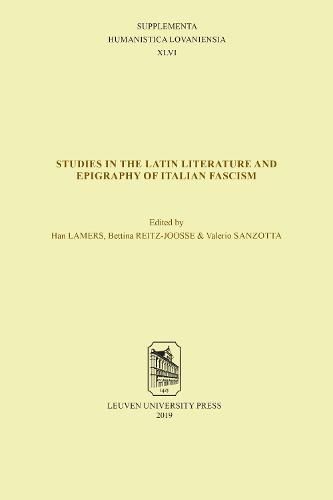Readings Newsletter
Become a Readings Member to make your shopping experience even easier.
Sign in or sign up for free!
You’re not far away from qualifying for FREE standard shipping within Australia
You’ve qualified for FREE standard shipping within Australia
The cart is loading…






This title is printed to order. This book may have been self-published. If so, we cannot guarantee the quality of the content. In the main most books will have gone through the editing process however some may not. We therefore suggest that you be aware of this before ordering this book. If in doubt check either the author or publisher’s details as we are unable to accept any returns unless they are faulty. Please contact us if you have any questions.
This book deals with the use of Latin as a literary and epigraphic language under Italian Fascism (1922-1943). The myth of Rome lay at the heart of Italian Fascist ideology, and the ancient language of Rome, too, played an important role in the regime’s cultural politics. This collection deepens our understanding of ‘Fascist Latinity’, presents a range of previously little-known material, and opens up a number of new avenues of research. The chapters explore the pivotal role of Latin in constructing a link between ancient Rome and Fascist Italy; the different social and cultural contexts in which Latin texts functioned in the ventennio fascista; and the way in which ‘Fascist Latinity’ relied on, and manipulated, the ‘myth of Rome’ of late nineteenth- and early twentieth-century Italy.
Contributors: William Barton (Ludwig Boltzmann Institute for Neo-Latin Studies), Xavier van Binnebeke (KU Leuven), Paolo Fedeli (Universita degli Studi di Bari Aldo Moro), Han Lamers (University of Oslo), Johanna Luggin (Ludwig Boltzmann Institute for Neo-Latin Studies), Antonino Nastasi (Rome), Bettina Reitz-Joosse (University of Groningen), Dirk Sacre (KU Leuven), Valerio Sanzotta (Ludwig Boltzmann Institute for Neo-Latin Studies), Wolfgang Strobl (Toblach)
$9.00 standard shipping within Australia
FREE standard shipping within Australia for orders over $100.00
Express & International shipping calculated at checkout
This title is printed to order. This book may have been self-published. If so, we cannot guarantee the quality of the content. In the main most books will have gone through the editing process however some may not. We therefore suggest that you be aware of this before ordering this book. If in doubt check either the author or publisher’s details as we are unable to accept any returns unless they are faulty. Please contact us if you have any questions.
This book deals with the use of Latin as a literary and epigraphic language under Italian Fascism (1922-1943). The myth of Rome lay at the heart of Italian Fascist ideology, and the ancient language of Rome, too, played an important role in the regime’s cultural politics. This collection deepens our understanding of ‘Fascist Latinity’, presents a range of previously little-known material, and opens up a number of new avenues of research. The chapters explore the pivotal role of Latin in constructing a link between ancient Rome and Fascist Italy; the different social and cultural contexts in which Latin texts functioned in the ventennio fascista; and the way in which ‘Fascist Latinity’ relied on, and manipulated, the ‘myth of Rome’ of late nineteenth- and early twentieth-century Italy.
Contributors: William Barton (Ludwig Boltzmann Institute for Neo-Latin Studies), Xavier van Binnebeke (KU Leuven), Paolo Fedeli (Universita degli Studi di Bari Aldo Moro), Han Lamers (University of Oslo), Johanna Luggin (Ludwig Boltzmann Institute for Neo-Latin Studies), Antonino Nastasi (Rome), Bettina Reitz-Joosse (University of Groningen), Dirk Sacre (KU Leuven), Valerio Sanzotta (Ludwig Boltzmann Institute for Neo-Latin Studies), Wolfgang Strobl (Toblach)